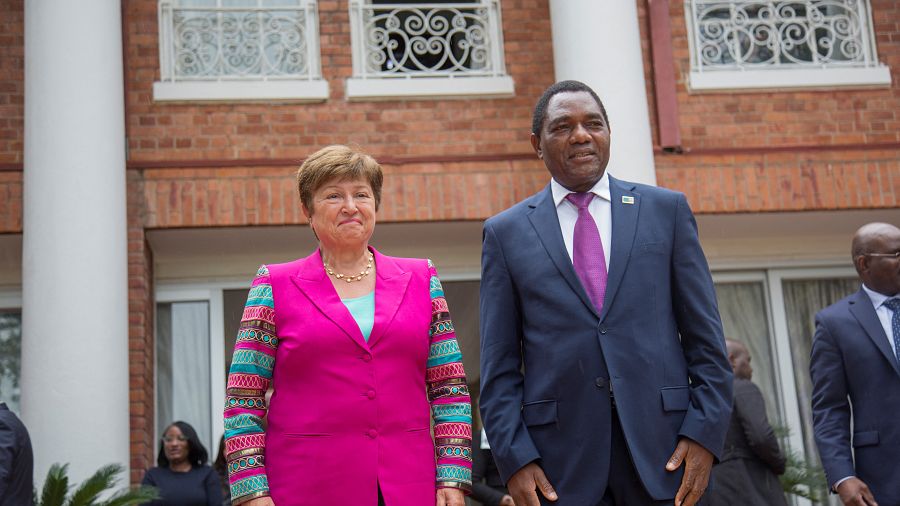
The main problem with IMF policies is that they are formulated by people in a boardroom in New York who have insufficient information on what can and cannot work here in Zambia.
By Sean Tembo | PeP President
Lusaka, Oct. 21 – For the past two years or so, Government’s policy on agriculture in general and maize production in particular, has been very chaotic, largely in two ways;
◾the failure to deliver farming inputs on time and in right quantities.
◾an insatiable appetite to export maize and mealie meal to neighbouring countries without due regard to our national consumption needs.
Also Read: Zambia would have been better under the Patriotic Front Government, Amb. Mwamba.
The end result of these haphazard policies has been shortages of maize on the market and high prices of mealie meal which have almost tripled from around K120 per 25kg bag when the UPND took over, to around K320 today.
But the question is; how did Government find itself implementing these haphazard policies that have undermined our maize production capacity and by extension our food security?
Well, it all started with the IMF programme. As part of its conditionalities, the IMF required Government to implement certain policies including getting rid of the Farmer Input Support Program (FISP) which has been the lifeline of subsistence and peasant farmers since as far back as 2003, in terms of receiving farming inputs.
FISP has been the cornerstone of our agriculture here in Zambia. Of course, like many Government run programmes, it was plagued with inefficiency, corruption and fraud, but the right thing to do was to clean it up and not scrapping it off.
The Minister of Agriculture’s recent announcement that FISP would be replaced with a loan scheme might look good on paper, but in reality it cannot work because the majority of our subsistent and peasant farmers are not doing farming as a business, but as a means to feed themselves.
They only sell what they consider to be excess, if any at all. So how are they going to pay the loan for farming inputs when they have eaten what they produced? Like we have argued before, the main problem with IMF policies is that they are formulated by people sitting in a boardroom in New York City who have insufficient information of what obtains on the ground here in Zambia, and what can and cannot work.
Similarly, the IMF instructed Government, as part of the conditionalities of the IMF loan, to export maize to neighboring countries like DRC, Kenya, Angola etcetera where the commodity has been in very high demand.
The reasoning was that we needed to expand our export base and possibly diversify away from our traditional mineral exports. Again, this looks good on paper, but in reality you need a very vibrant system in place to monitor the quantity and location of maize stocks nationally before you can embark on massive exports of the commodity.
Between earning forex and ensuring food security for the Zambian people, the later should be prioritized. But to the contrary, the UPND administration embarked on a blind export of maize and mealie meal without any regard to local consumption needs. The end result has been the current high prices of mealie meal on the domestic market.
Instead of taking responsibility for these poor policy decisions however, President Hakainde Hichilema and his Government have instead decided to politicize the issue.
They have introduced a superficial variable which is the ZNS mealie meal, which is said to be selling at K230 per 25kg bag and therefore cheaper to the current shelf price of around K320. However, what Government is failing to tell the people is that ZNS only has a capacity of less than 2,000 metric tonnes per month against a monthly national consumption of approximately 100,000 metric tonnes.
That means ZNS mealie meal accounts for less than two-percent of the total market and therefore has an insignificant impact on reducing the high cost of mealie meal. The ZNS mealie meal was merely introduced to make an unsubstantiated political argument that commercial milling companies are over-charging the market on mealie meal.
But everyone knows that ZNS employees who produce the mealie meal have their salaries paid by taxpayers whereas commercial millers have to foot the salaries of their employees including related costs such as NAPSA, Workman’s Compensation, Council Levy, NHIMA, Skills Levy etcetera.
Therefore, the argument by Government that since ZNS is able to sell it’s mealie meal at K230 versus a market price of about K320, then commercial millers are exploiting the market, is lame and lacks substance. The ZNS mealie meal prices might be self-pleasing and provide superficial relief to President Hakainde Hichilema, but it is not the solution. The ZNS mealie meal policy is like masturbation. The Zambian people do not want a Government which masturbates on important national matters like food security.
Also Read: New Heritage Party position on the announced ZNS milled mealie meal.
President Hakainde Hichilema should stop masturbating on this mealie meal issue. The Zambian people want real solutions not silly politicking. The President should grow up and provide sound leadership to the nation.
He is no longer an opposition leader who used to thrive on lies and innuendos. He is now the Head of State. He must stop the ongoing nonsense and politicking on mealie meal and provide sound guidance on our country’s food security. People are hungry. Very soon, the people will be angry.
Disclaimer: Any views, thoughts, and opinions expressed by the author are solely those of the author and do not reflect those of Woodpecker’s Digest but we feel compelled to remain a channel for verifiable and factual content.
Gain new perspectives online at Woodpecker’s Digest: Https://urlz.fr/o7Fg To make well-informed and thoughtful decisions, one must be able to see things from perspectives other than one’s own.
©2023 Woodpecker’s Digest.
Putting news into perspective








